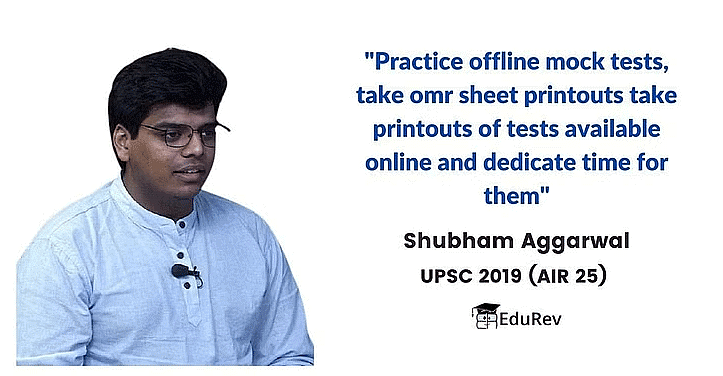Syllabus and Strategy to study Science & Technology for UPSC-CSE Prelims PDF Download
Importance of Science & Technology as a subject
Science & Technology is one of the fairly important subjects with respect to both UPSC CS Prelims and UPSC CS (Main) examination. It is included in the GS III paper for UPSC CS(Main) and General Studies paper in Prelims.
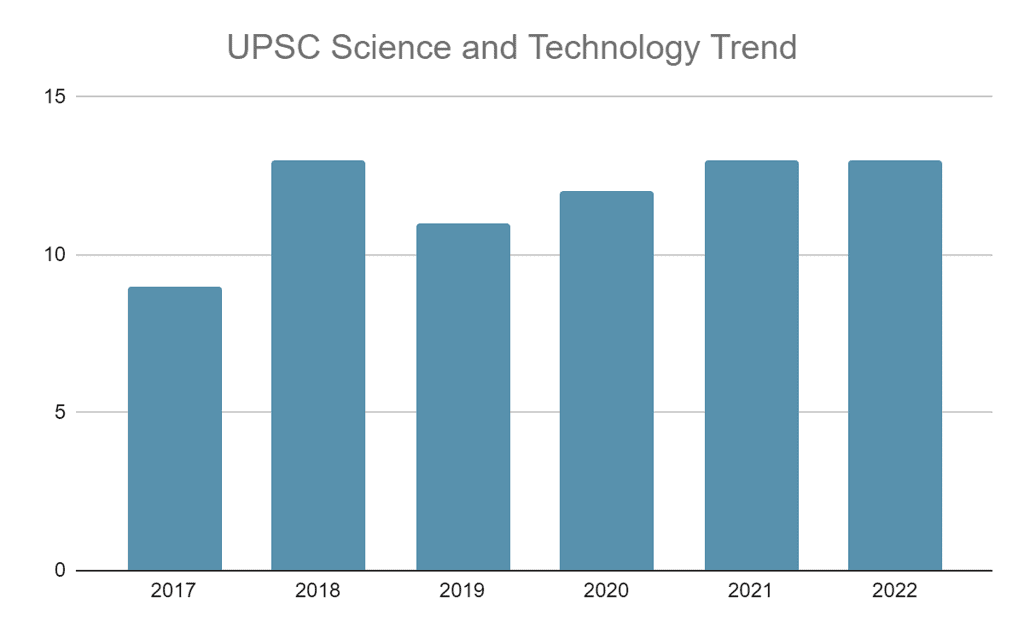
- Questions related to current developments in science and technology are asked in Prelims. Science and Technology is considered to be one of the abstract subjects that follow no fixed pattern or syllabus for both UPSC CS Prelims and Mains.
- However, the past year's trend analysis clearly shows that questions from this subject are analytical in nature.
How to Prepare for Science and Technology
The experts of EduRev, who've mentored thousands of students, including Anudeep Durishetty AIR 2017, Monica Kishore AIR 41 2018, Swati Sharma AIR 18 2019 & others, has compiled the syllabus & strategy for Science & Technology to help you prepare smartly for the exam, by providing you with the right guidance and relevant information. Our objective is to ensure that you should study what actually matters in the exam.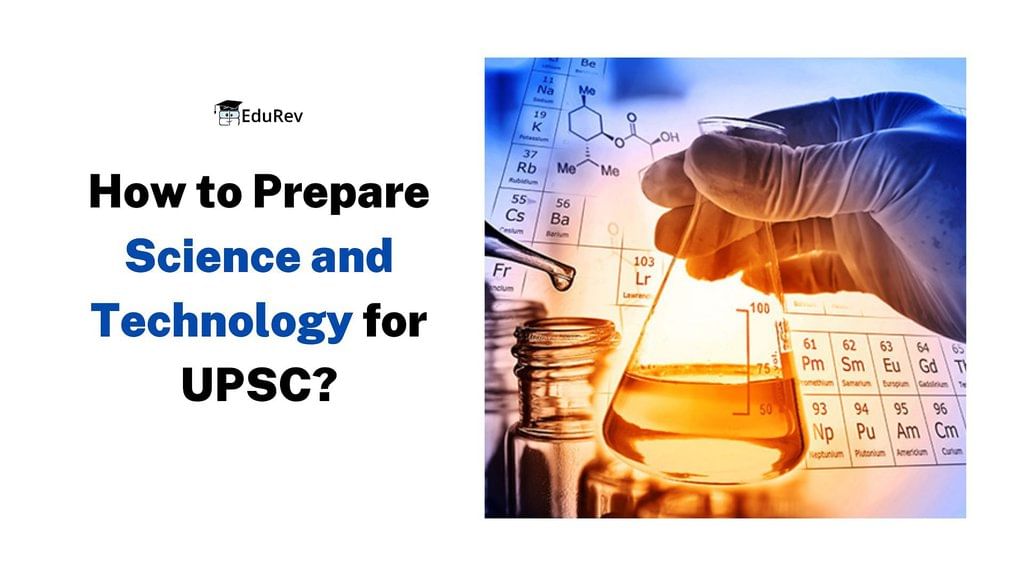
Step 1: Understand the Syllabus of Science and Technology
Questions related to current developments in science and technology are asked in Prelims. However, it is important to have a theoretical understanding of the static syllabus of the subject to qualify the exam with a good rank. Since this particular subject is boundless, you need to stick to the syllabus while preparing for the Science & Technology portion. Hence, always keep a copy of the syllabus in front of you and check if the topic is mentioned in the syllabus.
Let us first check what the UPSC syllabus tells about this section:
1. UPSC Prelims: General Science
2. UPSC Mains: Paper-III General Studies-III 250 Marks (Technology, Economic Development, Bio-diversity, Environment, Security and Disaster Management)
EduRev's team has listed the micro-topics for Science & Technology for UPSC and also discussed the preparation strategy to effectively cover the syllabus and helps you study what actually matters to crack the exam:
1. Physics: The Big Bang Theory, Quantum Mechanics, Fermions and Bosons, Four Fundamental Forces of Nature, Dark Matter, Negative Matter, Higgs Boson, Gravitational Waves, REE (rare Earth Element), FRP Composite Material & Applications, General Physics, Archimedes Principle, Unit & Measurement, Work, Energy, Power, Simple Pendulum & Restoring Force, Surface Tension, Elasticity, Nanotechnology.
2. Chemistry: Atoms & Molecules, Elements, Compounds & Mixtures, Basics of Nuclear Chemistry, Chemicals in Food: Artificial Sweetening Agents, Food Preservatives. Drugs: Antacid, Antihistamines, Neurologically Active Drugs -Tranquilizers, Analgesics. Antimicrobials - Antibiotics, Antiseptic and Disinfectant, Anti-Fertility Drugs, etc. Cleansing Agents: Soaps, Synthetic detergents, Glass, Water Softener, Water Purification/ Disinfection, Microwave Oven, etc.
3. Biology: Viral Diseases, Microbes, Cells - Plants vs Animals, Proteins, Amino Acids, Enzymes, Vitamins and Minerals – Deficiency Diseases, Fats: Healthy Fats and Unhealthy Fats, Human Digestive System, Respiratory System, Human Nervous System, Human Brain, Muscular and Skeletal System, DNA and RNA, Mitosis & Meiosis
4. Information Technology: Artificial Intelligence, IoT, Blockchain Technology, Automation, Net Neutrality3, Cyber Viruses
5. Achievements of Indians in Science & Technology: Chandrasekhara Venkata Raman, Acharya Jagadish Chandra Bose, Satyendra Nath Bose, Meghnad Saha, Homi Jehangir Bhabha, Subrahmanyan Chandrasekhar, A.P.J. Abdul Kalam, Vikram Sarabhai, Mokshagundam Visvesvaraya, Har Gobind Khorana, Tessy Thomas, C.N.R. Rao.
6. Indigenization of Technology & Developing New Technology: IT & Computers, Space technology: ISRO, GSLV, GSAT, INSAT, Scramjet Engine, Cryogenic Technology, Mars Orbit, Chardrayaan 1 & 2.
Biotechnology: Genetically Modified Crops, Anti Microbial Resistance, Gene Editing, Genome India Project, Robotics.
Defense Technology: Ballistic Missile, iDEX initiative, “Indradhanush” exercise, Apache Helicopters, NAVARMS-19, BrahMos Missile
7. Government Policies on Science & Technology Sector: Scientific Policy Resolution (SPR1958), Technology Policy Statement 1983 (SPR1958), Science and Technology Policy 2003 (STP2003), and Science Technology Innovation Policy 2013
Step 2: Analyze Previous Year Questions (PYQs)
Once you’re through the syllabus, pick up the previous year's papers and skim through them to get an understanding of what is actually asked in the exam.
- Solving previous year prelims question papers can aid a candidate in understanding the nature of questions and prepare accordingly.
- Look for the source that gives topic-wise questions of previous years. So that you can have a complete understanding of each topic and the type of questions asked.
- You can get the last 10-years of UPSC Prelims & Mains papers from here - UPSC Previous Year Question Papers.
- You can also refer to the topic-wise questions of Science & Technology from the last 25-years here.
Step 3: Build your Foundation: NCERTs
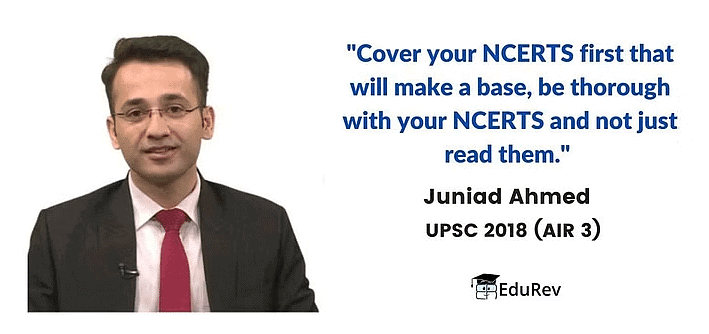
- NCERT Books build the foundation of knowledge on which aspirants can base their preparation. Once the basic concepts are cleared, they can move on to other sources of information and apply the knowledge gained for the UPSC exam.
- You can find all NCERT Textbooks arranged chapter-wise in NCERT Textbooks Class 6 to Class 12 course on EduRev.
- Here is a list of chapters from each book that UPSC aspirants have to cover in-depth for the exam for Science & Technology Section:
Book | Chapters |
NCERT Class VI Science | |
Class VII Science | |
Class VIII Science | |
Class IX Science | |
Class X Science | |
Class XI Biology |
|
Class XII Biology |
|
Class XII Chemistry |
Step 4: Read Important Reference Books
NCERT Textbooks cover a sufficient amount of syllabus in the Science and Technology Section.
So the list of NCERT books needed are:
- Science: Textbook for Class VI
- Science: Textbook for Class VII
- Science: Textbook for Class VIII
- Science: Textbook for Class IX
- Science: Textbook for Class X
- Biology: Textbook for Class XI
- Biology: Textbook for Class XII
Other Recommended Books for Science and Technology are:
- Science and Technology by Ravi P. Agrahari
- Science and Technology by Sheelwant Singh
Step 5: Perfect Your Concepts through Video Lectures & Detailed Notes
- Once you've studied all the mentioned books, you should refer to a single source of notes & video lectures which will help you to strengthen the concepts and understand the same topic from a different perspective.
- This will give you a fair idea of Science and Technology subject and will help you to keep things in mind for a longer period of time.
- Regular revisions through notes and video lectures can help strengthen the basics and boost one’s confidence in the subject. You can get topic-wise notes & video lectures in the Science and Technology course on EduRev, available on this link.
Step 6: Attempt Topicwise Tests
- MCQ Tests on all the topics (& sub-topics) of Sciene and technology subject are helpful for clear understanding, proper practice, and quick revision. These tests will help you in self-evaluation and you can check, whether you've understood a topic completely.
- Attempting Topicwise Tests will give you a fair idea about the type of questions being asked in recent years. It will also help you in revising effectively and efficiently.
- You can get topic-wise tests in the Science and Technology course on EduRev, available on this link.
- You can get the previous year's papers of UPSC Prelims & Mains here.
- And you can get questions from the last 25-years of UPSC prelims are arranged topic-wise here.
Step 7: Focus on Newspapers, Magazines & Current Affairs
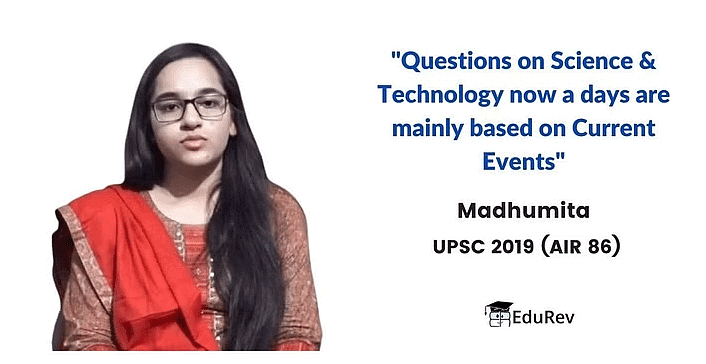
It has been observed that questions pertaining to current developments are often asked in UPSC CS Prelims as well as Mains. Hence, leverage editorials from the Hindu and the Indian Express to their fullest potential.
- Make small notes of the pointers for any recent development in the field of science. It includes space exploration missions, advancement in Artificial Intelligence, medications, reports surrounding the spread of diseases and their containment using scientific methods, etc.
- Further, you should expect a lot of questions from Science & technology this year owing to the ever-changing advancements surrounding COVID crisis management. Hence, you should regularly read about the reports on vaccine testing as well as the virus spread across the globe.
- You should classify science-related topics from Current Affairs into Biology, Chemistry, and Physics, etc. to organize the topics for revision.
- Official website of the Department of Science and Technology: Often questions are directly asked from the information given on government websites
- Try to relate the current with the static portion in NCERT books. Stay updated with current affairs from Current Affairs & Hindu Analysis: Daily, Weekly & Monthly course on EduRev.
Step 8: Improve your Understanding by Answer Writing
- As the pattern of the paper is evolving the candidate's horizontal expansion of the knowledge as well as the vertical limit of understanding of the topic is expected in a balanced proportion.
- For mains, practice answer-writing as much as possible and get your answers evaluated by your mentors. For science & tech, it is important to follow a diagram-based approach as well as add factual information for making your answers more substantive.
- Monthly current affairs for better understanding on the factual information related to science and technology are recommended.
- EduRev’s course on Essays provides you with sample essays to help you understand the pattern of essays.
Step 9: Attempt Mock Tests of Science & Technology
Attempt mock tests to understand your level of preparation and for self-evaluation. You can find subject-wise mock tests of Science & Technology in the UPSC CSE Prelims Mock Test Series.
EduRev has provided all the study material & tests which matters in your preparation for UPSC, compiled under multiple courses. You can refer to this document "How to study Science & Technology for UPSC using the EduRev app?" to understand it better & ace the exam smartly.
Effective Tips for Mastering Science & Technology in UPSC-CSE Prelims
Embarking on the journey to crack the UPSC-CSE Prelims demands a strategic mindset, especially when confronted with the Science & Technology section. To equip you with the necessary tools for triumph, here are some invaluable tips that will empower you to conquer the complexities and emerge victorious:
- Early Start: The UPSC-CSE Prelims is a fiercely competitive exam, making it crucial to initiate your studies early. By commencing ahead of time, you'll have ample opportunity to cover all essential topics and develop a solid comprehension of the subject matter.
- Embrace Assistance: Don't hesitate to seek help when encountering challenges in specific topics. Whether it's consulting a tutor, reaching out to a friend or family member, or exploring online educational resources like EduRev, embracing assistance will provide you with the necessary support to overcome hurdles.
- Stay Focused: Studying for the UPSC-CSE Prelims can be an arduous task, requiring unwavering focus. Maintain your concentration by setting realistic goals for yourself and maintaining a determined mindset. Remember, perseverance is key.
- Believe in Yourself: With sheer dedication and hard work, you possess the potential to accomplish your ultimate goal of clearing the UPSC-CSE Prelims. Cultivate self-belief and channel your efforts towards success.
These effective tips will serve as your guiding compass, propelling you towards mastering the Science & Technology segment of the UPSC-CSE Prelims and realizing your aspirations.
Happy Learning with EduRev!
Other Important Links
1. Check-Out subject wise Syllabus, & Strategy from these links:
- Syllabus & Strategy to study Geography for UPSC - CSE Prelims
- Syllabus & Strategy to study History for UPSC - CSE Prelims
- Syllabus & Strategy to study Indian Economy for UPSC - CSE Prelims
- Syllabus & Strategy to study Indian Polity for UPSC - CSE Prelims
- Syllabus & Strategy to study Environment for UPSC-CSE Prelims
2. Courses for all the subjects with detailed notes, video lectures & tests are available on EduRev:
History for UPSC CSE, Geography for UPSC CSE, Indian Polity for UPSC CSE, Science & Technology for UPSC CSE, Economy for UPSC CSE & others.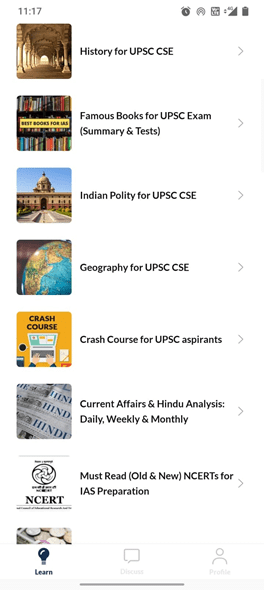

|
Explore Courses for UPSC exam
|

|
